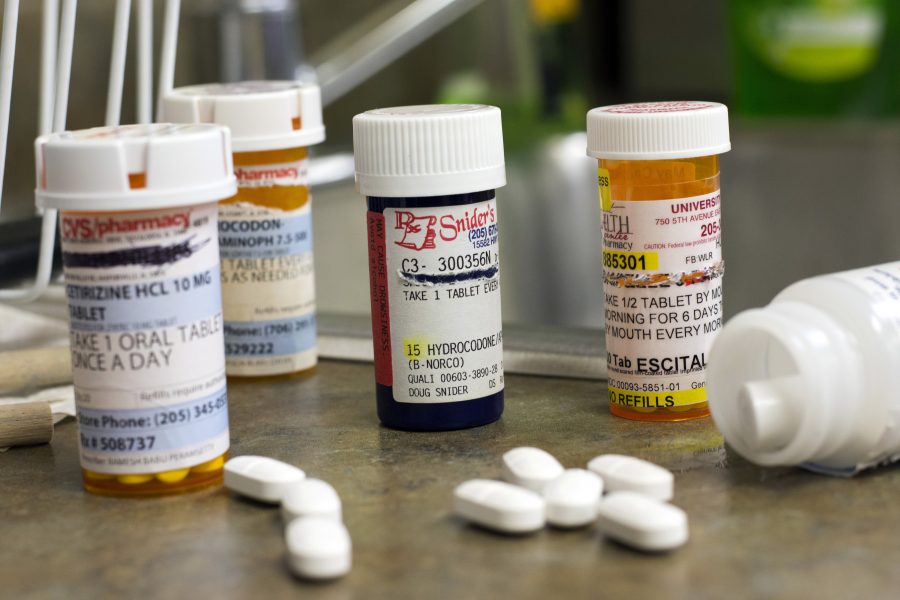Tears and snot dribbled down a one-year-old’s face as he tried to breathe through his swollen throat. Robert Bulloch wasn’t actually crying, but his cold made his little body puff up and leak like never before.
His parents gave him Zyrtec, an allergy medication commonly used for cold symptoms, but it only made him sleepy.
“He had some irritable behavior changes that can occur as well,” said Marilyn Bulloch, Robert’s mother and a clinical assistant professor at Auburn University and The University of Alabama. “If the drug had worked, we probably would have just been like, ‘Alright, it’s only for a few days; it’s really not a big deal,’ but it wasn’t effective at all.”
Bulloch and her husband then delved into the pharmaceutical jungle with a hunch and a hope to find a better solution for their child.
They realized this jungle wasn’t all that wild or unexplored, and the hunch they went in with, to use Allegra instead of Zyrtec, wasn’t unheard of.
Bulloch recalled her feeling of determination once they finished.
“It’s been studied in kids,” she said. “I have a dose. I’m giving it. The Allegra worked beautifully, and I use it for my current 16-month-old, too.”
Bulloch used this drug off-label, meaning she used medications in a way that isn’t directly approved by the FDA. Doctors prescribe off-label out of necessity to most efficiently treat their patients who also benefit from lower prescription costs.
Bulloch used both Zyrtec and Allegra off-label as they were originally allergy medications and not meant for children.
Adam Allen, a local pharmacist, said people often receive off-label prescriptions, but don’t ask about it.
“Most of the time, they’re using it under direction and they’ve already discussed it with their doctors,” he said.
Bulloch said children’s colds aren’t the only example where off-label prescription use can be beneficial and sometimes even necessary for the patient.
“Let’s look at an old friend: penicillin,” she said.
Penicillin is FDA-approved for respiratory tract infections and rheumatic heart disease, but it’s often the drug of choice for syphilis, rat bites and several skin infections.
Companies usually don’t renew patents because they don’t want to spend the vast amount of time and money necessary to do it, Bulloch said.
Colchicine, a drug generically used for decades to treat gout, became an exception to the rule when in 2013, URL Pharma applied for a patent. Once approved, the prices doubled from being around $30 for six pills to $60.
“We’ve seen the same thing with several of our life-saving medications in the ICU,” Bulloch said. “They’ve been cheap for a long time, and they’re very necessary to keep people alive.”
Vasopressin is the drug commonly used to treat septic shock, when the patient’s blood pressure plummets leading to organ failure and, more often than not, death.
In 2014, Par Sterile Products patented vasopressin for septic shock and the prices went from $3 a vial to $45.
“That’s hard for the patient whose copay has risen, and they worry if their insurance will even pay for it,” Bulloch said. “But what can you do? It’s going to keep you alive.”
Dr. Lynx McClellan, a registered nurse, brings up a different reason for the need of off-label use.
“Maybe the medications were originally made for a certain illness, injury or disease, but it became easier to approve it for something else,” she said.
Not everyone is as gung ho for off-label use, however.
Just this year, the daughter of the late Alabama athletic director Mal Moore sued Wyeth Pharmaceuticals Inc. and Par Pharmaceutical Companies Inc. because of what she considered off-label use of her father’s prescription, amiodarone.
According to the suit, amiodarone is FDA-approved only “as a drug of last resort for patients suffering from documented recurrent life-threatening ventricular fibrillation and ventricular tachycardia,” but Moore’s doctors used his prescription as the primary method of care.
However, Bulloch thinks this lawsuit is grasping at straws.
“I think his prescription was used appropriately,” she said. “It’s unfortunate that it happened to him, but he was the victim of a known side effect.”
Even if the Moores win the lawsuit, Bulloch said doctors should continue to prescribe medications off-label.
“You would drastically limit treatment options in this country if you didn’t use off-label use,” she said.
McClellan and Bulloch both support some sense of caution with prescriptions.
“More than anything, it’s important that the doctor discloses the difference in the drug usage,” McClellan said.
Bulloch cautions all medication use.
“In every drug there’s a little bit of poison, even in placebos,” she said. “You see it in our studies. The people who receive the placebos still experience some form of side effects.”
Therefore, Bulloch doesn’t recommend people hit the computer for new medications the second they spy the price tag on their newest prescription unless they have clinical training.
Despite being a big proponent for off-label use, Bulloch can’t wait to put away the Allegra.
“Once my eldest goes to kindergarten, we’re good,” she said. “He will have been exposed to all of those germs, and we will have gotten everything out of the way.”









